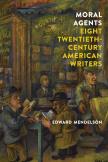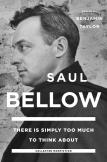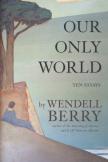Responsible Writers
I find it interesting when a writer who is as eloquent, longsuffering and respected among his peers as Wendell Berry becomes almost irrelevant in public discourse. He isn’t trying to sell us anything. He doesn’t seem concerned about his image. He doesn’t scream or get arrested or perform. And we don’t even have to tune him out; his writing goes out on a frequency that is rarely even heard.
Take, for instance, what he has to say in his newest collection of essays, Our Only World, about the Boston Marathon bombing of 2013. After unequivocal sympathy with those who were injured or lost a loved one, he adds: “What I am less and less in sympathy with is the rhetoric and the tone of official indignation. Public officials cry out for justice against the perpetrators. I too wish them caught and punished. But I am unwilling to have my wish spoken for me in a tone of surprise and outraged innocence.” And this is where, if anyone thought Berry’s writing important, they would be protesting: “The event in Boston is not unique or rare or surprising or in any way new. It is only another transaction in the commerce of violence.”
Just now, as I write this, there is news from the trial of the Boston bombing suspect Dzhokhar Tsarnaev, and even public radio’s accounting of it sounds a cynical tone. Tsarnaev’s Russian relatives were in Boston testifying for the defense, and his aunt wept uncontrollably in court while talking of the promising boy he’d been. She told of his childhood, when he never hurt anybody, and she remembered how he cried while watching “The Lion King.” Tsarnaev cried, too, and then blew a kiss to his family from his place in the dock. Prosecutors were unhappy with this development. They need him to be a monster so they may more easily convince jurors to execute him for his crimes.
But Wendell Berry is only a writer, and gone are the days when writers influence public opinion in the way that only celebrities and politicians do today. Writers are no longer counted among those listened to on matters of moral importance. What brought about this change? Half a century ago James Baldwin, W. H. Auden, Norman Mailer, Hannah Arendt, Arthur Miller, Flannery O’Connor and Saul Bellow were on the covers of magazines, interviewed on television. They were celebrities, and they both wrote and spoke about issues of moral importance. I think there are a few reasons.
For one, we have seen a sanctifying and fetishizing of the private and the personal. We listen only to those who are more exposed than we are. We want to know all there is to know about where people grew up, what they wear, whom they sleep with, their gendering and sexuality, their feuds, their friends. Only when someone has submitted to this sort of scrutiny and exposure do we trust him or her. Then, what we’re trusting is our own scrutiny and opinion of the scrutinized, not the person. This is why Facebook seems real and reality television shows seem normal.
All of this attention to private and personal matters comes in the wake of what used to be an assumed need for shared cultural literacy. That has vanished, but it would seem to be impossible anyway. And what’s too large to grasp we easily replace with small, private, mostly irrelevant but easily relatable details.
We also live in a time when images have replaced words as most important, accessible and appealing. This has happened quite recently. People were predicting that film would replace books a century ago, but it took technology most of that century to make film/video easily accessed, streamed, copied, created and shared to the point where images have won the day. To the victor go the spoils, and what’s left behind (writing and reading) seems boring. Those who traffic in words are among the most boring.
Then there is the way in which culture has become a commodity. Was it 40 years ago now that Robert Haft, the chairman of Crown Books, shouted from a full page ad on the back of The New York Times Book Review: “Books Cost Too Much”? That was The beginning of the end of books and authors as purveyors of culture. Books became commodities just like every other form of “entertainment”—and to make them entertainment was to force them to play a game that books were sure to lose.
As a result, old ways of lionizing “the writer” disconnect with nine out of 10 people today. Even to my ear, as someone who laments all of what I have just written above, there is something indolent in how certain writers talk about creating “literature.” I’m thinking, for instance, of Richard Ford in the introduction to his collected Bascombe novels (Everyman’s Library, 2009). Ford admires Thoreau, who believed “a writer is a man who, having nothing to do, finds something to do,” and Northrop Frye, who wrote: “Literature is a disinterested use of words. You need to have nothing riding on the outcome.” Even in the quiet of my study, if I believed such romanticism, I would never say so out loud. I want writers to matter.
Fifty years ago one would never have accused Saul Bellow or Norman Mailer of indolence or disinterestedness. They aimed to do much more than entertain. But where are the writers today who influence us with their moral compass or with their grasp of what is necessary, as opposed to what is expedient?
Edward Mendelson’s new book, Moral Agents, gets at these issues, but does not do it very well. He looks longingly back to the days when writers were “moral agents” but then he defines morality too broadly. “Morality…is a matter of the inner logic of actions and consequences, not of precepts and rules.” So any action, behavior or opinion can be described as moral.
Mendelson is actually lamenting the loss of public intellectuals. On his list, all from the mid-20th century, are Lionel Trilling, Dwight Macdonald, Alfred Kazin, William Maxwell, Saul Bellow, Norman Mailer, W. H. Auden and Frank O’Hara. “By the early twenty-first century, the American public intellectual had largely disappeared,” he opines, perhaps ignoring David MacCollough, David Brooks, Wendell Berry, Marilynne Robinson and Jonathan Franzen? And those are just the ones known first as writers.
Mendelson doesn’t make his argument any easier when he is difficult to read. I thought similarly when I read Early Auden and Later Auden years ago, books for which Mendelson was rightfully lauded. But in his books, ideas are often provoked and veiled, more than revealed and explained, like bait held just above the water’s surface. For example, I’m still puzzling over “the inevitable melancholy of unfreedom.”
The writers for whom I feel most sorry are the ones who go out of their way to try to influence public opinion through literature. Moral intentionality isn’t enough, as one learns when reading the biography of most any of our most important novelists. Saul Bellow was no saint—or mensch—and yet the new collection of his nonfiction, There Is Simply Too Much to Think About, is a rewarding reminder of how novelists used to try. And be heard.
Do you remember when Jonathan Franzen refused to appear on “The Oprah Winfrey Show” to discuss his novel being picked for her famous book club? There was a serious writer refusing to be commodified. It didn’t go well for him. Even literary critics like Harold Bloom of Yale and Lewis Lapham of Harper’s magazine called Franzen names in print. Most of all, there was a lack of generosity and a sort of prissiness in Franzen’s refusal.
Which leads me back to Wendell Berry. Has there ever been an American writer who was more generous? That also means he is unsuited to media exposure. Berry doesn’t speak in sound bites. He doesn’t rant. He is kind. And then there are the boots worn without irony. Which is why when he writes, “We have formed our present life, including our economic and intellectual life upon specialization, professionalism and competition”—it isn’t that he is immediately called a Marxist (we would have done that 50 years ago), we just don’t pay any attention at all. And we should.
This article also appeared in print, under the headline “Responsible Writers,” in the June 22-29, 2015, issue.










